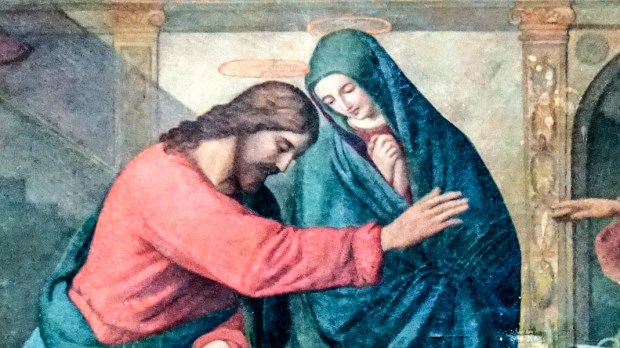Now there were six stone water jars there for Jewish ceremonial washings,each holding twenty to thirty gallons.Jesus told the them,“Fill the jars with water.”So they filled them to the brim.Then he told them,“Draw some out now and take it to the headwaiter.”So they took it. And when the headwaiter tasted the water that had become wine,without knowing where it came from— although the servers who had drawn the water knew —,the headwaiter called the bridegroom and said to him,“Everyone serves good wine first,and then when people have drunk freely, an inferior one;but you have kept the good wine until now.”—John 2:6-10
In a reflection given to her sisters on the second Sunday after Epiphany (ca.) 1170, the Benedictine abbess St. Hildegard of Bingen naturally based her reflections on the Gospel of the day—the Miracle at Cana.
As mater and magistra (“mother and teacher”), Abbess Hildegard would have been entrusted with the responsibility of teaching the nuns in her monastery and her reflections on the Gospels demonstrate Hildegard’s brilliance and expansive knowledge of Scripture.
Two of her reflections on this text have come down to us, and in the second reflection she presents the transformation of water into wine as a symbol of the new birth that takes place within the soul when we commit ourselves to faith and to trying to live a virtuous life. St. Hildegard sees in this story an allegory for the saving, liberating mission of the Savior, who invites us to walk the path of virtue.
It’s a valid and beautiful part of our faith tradition to read the stories of Scripture in such a personal way. However, while this way of reading Scripture can inspire us to reflect on how the power of Christ transforms each of us, we risk losing sight of the principal meaning of the story if we make it too self-referential. And, in point of fact, St. John himself attaches a sort of commentary at the end of the story when he remarks, “Jesus did this as the beginning of his signs at Cana in Galilee and so revealed his glory” (2:11).
John is reminding us that the great miracle at Cana is an invitation for us to enter more deeply into the mystery of who Jesus is and what his saving mission is really all about.
When we consider Sunday’s Gospel in this light, we recognize how intimately connected the miracle at Cana is to the other Epiphany mysteries of the Magi’s visit and the Baptism of Jesus (we see this spelled out in the Magnificat antiphon of Evening Prayer II of the Epiphany). In fact, many of the passages from the gospels proclaimed on both Sundays and weekdays during the coming weeks of Ordinary Time will include accounts of miracles and references to historic prophecies, helping us explore Who it was we celebrated during the Christmas Season and Who it is who has come among us.
As Henri Nouwen observed, “His many miracles always serve to express his profound compassion with suffering humanity; never are they attempts to call attention to himself.” Even in the account of the wedding at Cana, Jesus isn’t inserting himself into the narrative. Rather, he’s responding to the needs of wedding party, presented to him by his interceding mother.
Perhaps one of the lessons of the miracle of Cana is that the Lord—whom we believe is with us—is waiting for us to let him know what it is we need and to trust that he will provide for us with “good wine,” exceeding what we might expect or imagine. This reminds us of the words of the Prophet Isaiah in our First Reading, “No more shall people call you ‘Forsaken,’ / or you ‘Desolate,’ / but you shall be called ‘My Delight,’ / and your land ‘Espoused.’ For the Lord delights in you.”
As we continue our journey into Ordinary Time, we are being invited to reflect on what the Lord is offering to us and to look at the world around us and to lift up to the Lord those who have been forgotten, who are alone, and who have no one to pray for them, following the example of the Mother of Jesus.
Whom do you see who has “no wine”? What can you do to help relieve their suffering? Reread the story of the wedding at Cana. How do the many symbols in this story help you to see Jesus in new ways? When has the Lord provided “choice wines” in your life? With whom did you share those gifts?
Words of Wisdom: “This transformation of the water from its own substance into another testified to the powerful presence of the Creator. Only he who had made it out of nothing could change water into something whose use was quite different … as a man he was present at the wedding, and as God he changed the water into wine. If such is our faith, the Lord will give us also to drink of the sobering wine of his grace.”—St. Maximus of Turin, Homily 23

